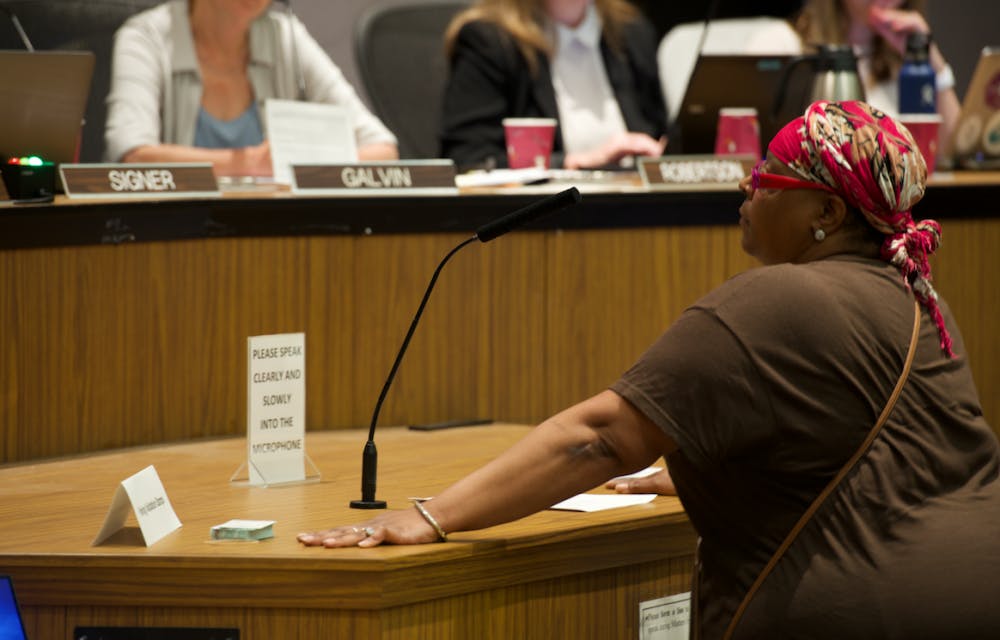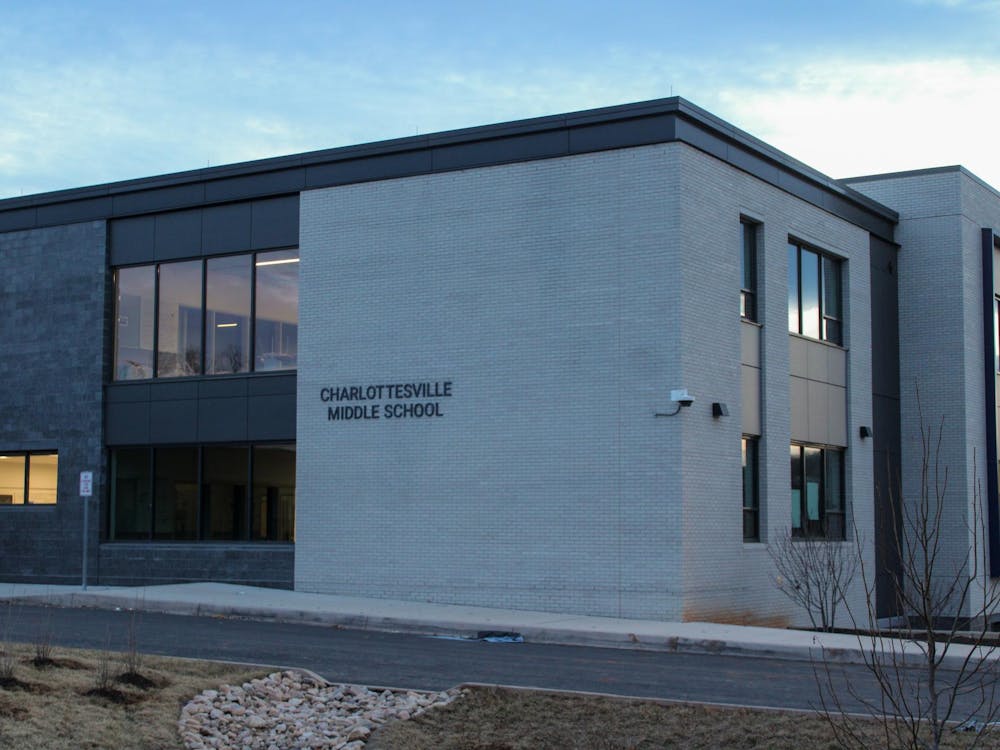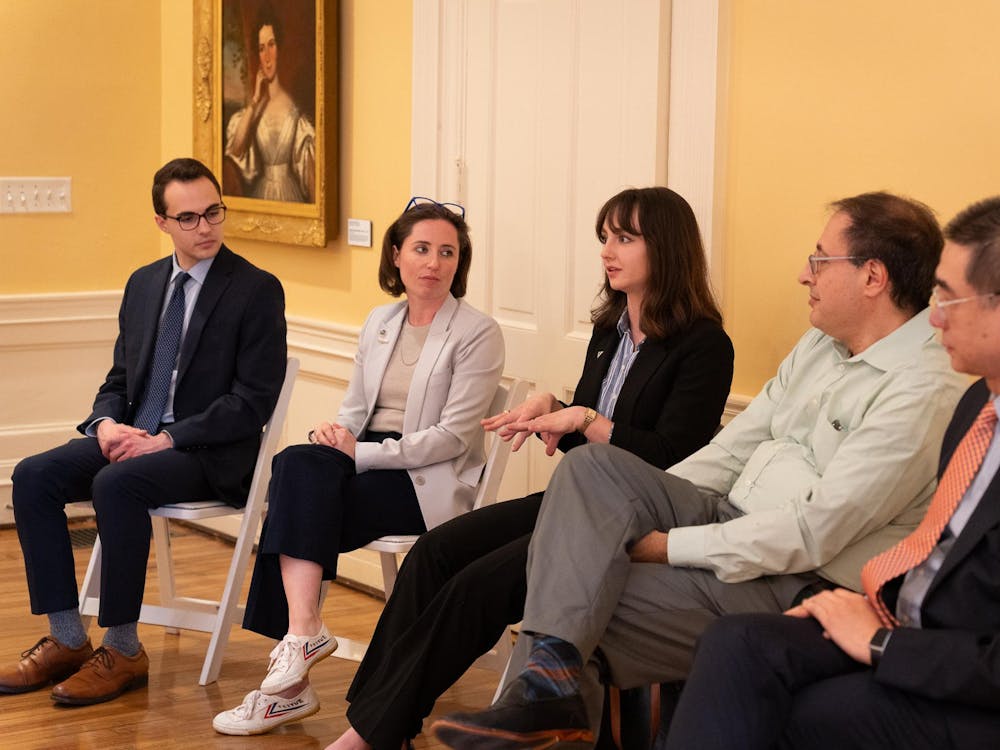The Charlottesville City Council held a final public hearing at its meeting Monday night regarding the establishment of a police civilian review board. The Council will appoint seven inaugural applicants to aid in the establishment process of the full board at the June 4 Council meeting.
The establishment of the board was originally approved by the Council late last year to replace the police citizens advisory panel — which has existed in Charlottesville since 2008 — in order to aid the chief of police and city manager in “building positive citizen relationships, encouraging widespread police and citizen engagement.”
However, the effectiveness of the panel was called into question and was heavily criticized by speakers at Council meetings last year after the violent white nationalist events of this past summer. Speakers at past meetings as well as have claimed the management of police personnel was insufficient in preventing violence between white supremacist “Unite the Right” demonstrators on Aug. 12 and counter-protesters.
Monday’s hearing was the last of a series of opportunities hosted by the Council to allow community members to give feedback on the candidates for the board, its structure and purpose. A community candidate forum was also held last month to allow for applicants to the board to respond to public concerns regarding the Charlottesville Police Department, improving policing strategies and building relationships between law enforcement personnel and the community.
According to City Manager Maurice Jones, an initial board comprised of seven members will be appointed by the Council at the body’s June 4 meeting to allow for the drafting of bylaws and the development of a statement purpose for the formal board — a process which is slated to last approximately six months. Board members will serve one year terms.
During this time, Jones said the initial board will regularly hold public meetings and engage the community in the development of its bylaws which will culminate in a written report proposing a set of bylaws and a statement of purpose to be considered by the Council.
During the hearing, speakers repeatedly emphasized the themes of police accountability, transparency and the need for the board to be independent from the Council and police department in its operations. In particular, many speakers said that CPD personnel needed to be held accountable for allegedly allowing white nationalist demonstrators to assault counter-protesters last August.
“There needs to be some accountability for last summer — It’s not over,” said Curry School Assoc. Prof. Walt Heinecke. “There needs to be an investigation, and you [Council] need to take some responsibility for figuring out what went wrong and how it went wrong and take some ownership of how that went wrong. Accountability is incredibly important for … rebuilding public trust. You're not going to get that without accountability.”
Heinecke added that the Council and CPD must reckon with the cultural and institutional racism present that many see in modern policing tactics that many see before being able to move forward.
“The problem runs much deeper in terms of the culture of the CPD — and you're going to have to address that,” he said. “The real solution for the CRB is rebuilding trust with this community, especially the community that showed up last summer — you've marginalized them in the past, [and] you have to start listening to those people in the community.”
Brandon Collins, an organizer for the Public Housing Association of Residents, said the goal of the board should be allowing the community to exercise control over the police department.
“I want to stress the independence of this review board,” Collins said. “It [the Dillon rule] severely limits your ability to put into an ordinance anything that really makes sense — anything that gives this board true power, subpoena power or anything that makes it truly independent.”
Collins added that since there are legal restrictions to allowing the board to discipline or subpoena law enforcement personnel, the Council must fully support the board in such efforts.
“There's nothing to keep the police department … or City Council from supporting this independent review board from acting as if it's truly independent and as if it has subpoena powers and as if the recommendations it makes are truly implemented,” Collins said.
Local activist and City resident Rosia Parker said the CRB needed to aid in the reform process of how police officers interact with the local community — particularly communities of color.
“Policing is when you come into your community and you get to know your community, you get to have a relationship with your community,” Parker said. “But if you're trying to have a relationship with your community where you're not trying to get to know your community members besides when their just coming in for a drug bust or when they're coming in to just try to set us up or while they're out there watching us, I feel there is some accountability that needs to be taken.”
Don Gathers — former chair of the Charlottesville Blue Ribbon Commission on Race, Memorials and Public Spaces, one of the founders of Charlottesville’s chapter of Black Lives Matter and a candidate for the CRB — said that board must be able the ability to enforce its decisions.
“Accountability, responsibility, independence — these are the pillars that we've got build this CRB on,” Gathers said. “It is of tantamount importance that the particular board has subpoena powers and investigative powers.”
Gathers added that rebuilding trust between the CPD and the community would be essential for the success of the CRB.
“You have got to build some microcosm of trust back into this community with the police — and that’s what’s sorely lacking more so than anything else,” Gathers said. “There is not a modicum of trust — especially between the black community and the police department right now that exists … Unless we are willing to actually put some teeth into this CRB and give the people the weight behind that they need in order to do the work that obviously is necessary, we are wasting time again.”
Jeff Fogel, a local civil rights attorney and a candidate for the CRB, expressed his skepticism regarding how the Council would maintain the independence of the board and limit the influence of city staff and the police department.
“You have signed on to the notion of an independent review board — how are you going to ensure that its independent?” Fogel asked. “How do you ensure a board is independent when it is politicians who are picking the people who are members of the board, each of whom have their own views? Is this body going to support the Civilian Review Board when it asks for information?”
Mary Carey, a lifelong Charlottesville resident and local activist, said many community members felt abandoned by law enforcement personnel during the events of Aug. 11 and 12, citing her experience with police officers in the city during the Civil Rights Movement.
“I grew up in this town 72 years ago [and] they had police officers walking beats,” Carey said. “We knew these police officers, we protected these police officers from the KKK who were protecting us from the KKK. Now, we need that protection from police from the KKK, but a lot of the police officers are the KKK. It’s for you all [Council] to understand that there is still so much hurt and pain in this city.”







